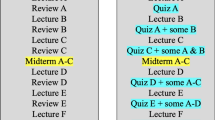Abstract
The aim of the present research is to examine the viability of the construct validity of the speaking modules of two internationally recognized language proficiency examinations, namely IELTS and TOEFL iBT. High-stake standardized tests play a crucial and decisive role in determining the future academic life of many people. Overall obtained scores of candidates are believed to reflect their general proficiency level. Appropriate interpretation and use of test scores depend on the extent to which items measuring a particular skill (here speaking) can meet the criteria to examine the intended construct. Speaking, amongst the other four skills, has a central place in assessing general proficiency of the candidates. This research seeks to scrutinize how IELTS and TOEFL iBT tap on the speaking proficiency of their candidates. Moreover, this study investigates whether obtained speaking scores of candidates in these two international high-stake tests show an acceptable degree of consistency in measuring the skill being examined. The chosen sample of the study consisted of 60 students who successfully completed TOEFL iBT and IELTS preparation courses in Tehran. The results of the statistical analysis show that there is a meaningful discrepancy between the two exams in assessing the speaking abilities of the exam-takers and therefore challenge the construct validity of the exams in question. Findings are then used to discuss the repercussions for language proficiency measurement and assessment.
Similar content being viewed by others
References
Bachman, L. (1990). Fundamental considerations in language testing. New York: Oxford University Press.
Bachman, L. F. (2000). Modern language testing at the turn of the century: Assuring that what we count counts. Language Testing, 17, 1–42.
Bachman, L. F., & Palmer, A. S. (1982). The construct validation of some components of communicative competence. TESOL Quarterly, 16, 449–465.
Bachman, L. F., Lynch, B. K., & Mason, M. (1995). Investigating variability in tasks and rater judgments in a performance test of foreign language speaking. Language Testing, 12, 238–257.
Baleghizadeh, S. (2007). Speech acts in English language teaching. Iranian Journal of Language Studies, 1, 143–154.
Biber, D., Conrad, S., Reppen, R., Byrd, P., Helt, M., Clark, V., Cortes, V., Csomay, E., & Urzua, A. (2004). Representing language use in the university: Analysis of the TOEFL 2000 spoken and written academic language corpus. (TOEFL Monograph Series No. 25). Princeton, NJ: Educational Testing Service.
Brown, A. (2006). An investigation of the rating process in the IELTS oral interview. In M. Milanovic, & C. Weir (Series Eds.) & L. Taylor, & P. Falvey (Vol. Eds.), Studies in language testing, Vol. 19. IELTS collected papers: Research in speaking and writing assessments (pp. 316–377). Cambridge: Cambridge University Press.
Brown, J. D. (2000). Questions and answers about language testing statistics: What is construct validity? JALT Testing & Evaluation SIG Newsletter, 4(2), 7–10.
Butler, F. A., Eignor, D., Jones, S., McNamara, T., & Suomi, B. K. (2000). TOEFL 2000 speaking framework: A working paper (TOEFL Monograph No. MS-20). Princeton, NJ: Educational Testing Service.
Canale, M. (1983). From communicative competence to communicative language pedagogy. In J. C. Richards & R. Schmidt (Eds.), Language and communication. London: Longman.
Canale, M., & Swain, M. (1979). A theoretical framework for communicative competence. In A. S. Palmer, P. J. M. Groot, & G. A. Trosper (Eds.), The construct validation of tests of communicative competence. TESOL (pp. 31–36). Washington DC: TESOL Publication.
Cronbach, L. J. (1984). Essentials of psychological testing (4th ed.). New York: Harper Row.
Fulcher, G., & Davidson, F. (2007). Language testing and assessment: An advanced resource book. London: Rutledge.
Miller, M. D., & Linn, R. L. (2000). Validation of performance-based assessments. Applied Psychological Measurement, 24, 367–378.
Salmani Nodoushan, M. (2011). The place of genre analysis in international communication. International Journal of Language Studies, 5, 63–74.
Shomoossi, N., & Ketabi, S. (2008a). Authenticity within the EIL paradigm. Iranian Journal of Language Studies, 2, 173–186.
Shomoossi, N., & Ketabi, S. (2008b). Assessment in a multi-lingual world: English as an international language (EIL). Iranian Journal of Language Studies, 2, 381–386.
Taki, S. (2011). Cross-cultural communication and metaphorical competence. International Journal of Language Studies, 5, 47–62.
Wesche, B. (1987). Second language performance testing: The Ontario test of ESL as an example. Language Testing, 4, 28–47.
Xi, X. (2008). Validating the use of TOEFL iBT speaking section scores for ITA screening and setting standards for international teaching assistants. (Research Spotlight. No. 1). Princeton, NJ: Educational Testing Service.
Zareva, A. (2005). What is new in the TOEFL-iBT 2006 test format? Electronic Journal of Foreign Language Teaching, 2(2), 45–57.
Author information
Authors and Affiliations
Corresponding author
Rights and permissions
About this article
Cite this article
Zahedi, K., Shamsaee, S. Viability of construct validity of the speaking modules of international language examinations (IELTS vs. TOEFL iBT): evidence from Iranian test-takers. Educ Asse Eval Acc 24, 263–277 (2012). https://doi.org/10.1007/s11092-011-9137-z
Received:
Accepted:
Published:
Issue Date:
DOI: https://doi.org/10.1007/s11092-011-9137-z




